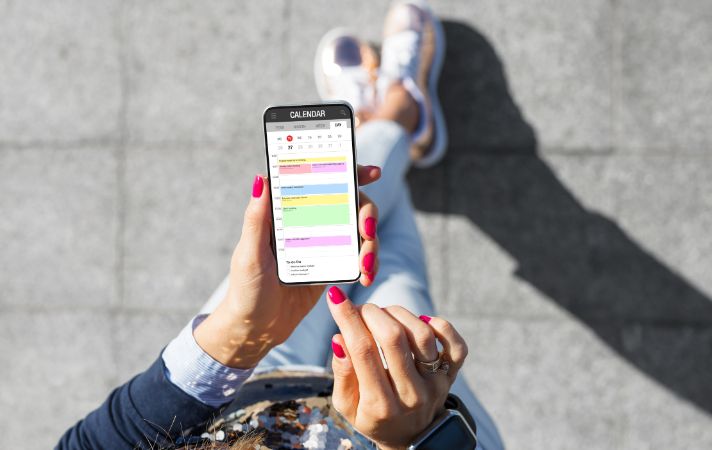Technology is always developing at a rapid rate.
Its advancement has made way for a plethora of new opportunities and capabilities that we couldn’t even imagine a few years ago.
Unsurprisingly, technology is now being used in the legal sector.
But not just by solicitors, but those who have been exposed to the judiciary system.
We’re talking specifically to those who have experienced divorce. And in particular, those who are parents and now must co-parent.
As solicitors who practise divorce law, it’s important for us to keep up with these technological advances.
In this article, we will look at the technology available to help couples co-parent and what the benefits of using this technology are.
Disclaimer: Co-parenting is a complex topic and should be carefully navigated with all parties involved. Brown Turner Ross does not offer any specific recommendations and due diligence should be done before implementing any ideas from this blog. Please seek the advice of co-parenting experts if you need help with your co-parenting situation.
Potential Ways of Using Technology for Co-Parenting

As a parent, you want to always do right by your children no matter what. Even when that involves being in a situation where you’re co-parenting.
After all, you don’t want to compromise your parenting just because you’re in a complex situation.
Using technology you can ensure that there is a healthy flow of communication between you and the other parent so that schedules and routines can be adhered to.
Here are a few ways that technology is currently used for co-parenting:
- Shared calendars – Set up shared digital calendars using platforms like Google Calendar or Microsoft Outlook. This system can be used so that you and your co-parent understand so schedules are easy to identify e.g. colour coding.
- Co-parenting apps – Explore co-parenting apps designed to facilitate communication and organisation. These can offer features like shared calendars, expense tracking, and messaging.
- Communication channels – Keep communication open. It could be email, messaging apps, or a dedicated messaging feature within the co-parenting app. Ensure both of you are comfortable with the chosen platform.
- Share important documents – Cloud storage services such as Google Drive or Dropbox are great for sharing important documents like school schedules, medical records, and legal documents. If you need to share important information, this can ensure both parents have access to relevant information.
- Expense tracking – If the co-parenting app doesn’t include an expense tracking feature, consider using a separate expense tracking app or a shared spreadsheet on Google Sheets.
- Use parenting plan software – If necessary, implement parenting plan software to create, modify, and manage parenting schedules. These tools can assist in outlining custody arrangements and visitation schedules.
- Online co-parenting courses – Consider enrolling in online co-parenting courses or accessing resources that provide guidance on effective communication, conflict resolution, and child-focused parenting. This can help you improve your co-parenting skills.
- Establish social media guidelines – You may need to discuss and agree on guidelines for sharing information about your children on social media. Define what is appropriate to share and what should remain private to maintain consistency in parenting approaches.
These are all ideas to help you keep communication open and honest. You should consider enlisting the help of a co-parenting expert to help you find your best solutions.
Benefits of Using Technology for Co-Parenting

Co-parenting technology has huge benefits for its users. This technology was developed and launched to alleviate problems and make the co-parenting process smoother.
Here are some potential benefits of using technology with co-parenting:
Improved Communication
Sharing parenting duties involves a lot of communication back and forth so that schedules and deadlines are set.
Technology can help facilitate instant communication, allowing co-parents to stay connected regardless of their physical location.
Thanks to the sheer number of messaging platforms there is always a way to keep an open communication line between you and your co-parent.
What you choose is up to you, as long as it works best for both parties and can embed easily into daily schedules.
Embedding technology early on can help prevent situations that develop into stonewalling further down the line.
Real-Time Updates
Co-parenting apps and digital communication tools enable real-time updates on changes to schedules, appointments, or other important information.
This reduces the risk of miscommunication and keeps both parents well-informed. Missing key appointments can cause conflict and cause discomfort for you and your children.
Schedules and plans are susceptible to change so it’s better to be prepared for this and be proactive by making sure everyone affected is informed of the changes.
Remote Co-Parenting
Video conferencing tools enable remote co-parenting discussions, meetings, or virtual visitations.
This can be beneficial for long-distance co-parenting situations, allowing parents and children to stay connected despite geographical distances.
While the majority of co-parents will be within close proximity of each other, at some point they may be away for a period of time.
Therefore, they will also benefit from video calling technology when needed.
Increased Accountability
Technology provides a digital trail of communication and shared responsibilities, promoting accountability.
This can be useful in legal matters and helps establish a clear record of each parent’s involvement in the children’s lives.
In co-parenting, accountability is huge. The courts will make you and your co-parent accountable for your actions as children’s care is placed above all else.
Having accountability can help maintain a high standard of care for children and if there are any disputes then technology can provide appropriate evidence to get to the bottom of them.
Time Efficiency
Digital tools streamline various co-parenting tasks, saving time and effort.
From scheduling to communication, technology allows you to manage responsibilities more efficiently, freeing up time for other aspects of their lives.
Time is one of your most valuable resources so when you begin co-parenting sometimes your daily schedule will need to be adjusted.
This can cause disruption and wasted time, especially in the early stages.
When incorporating technology, you can experience less disruption and nail down an efficient process that allows you to maximise your time as a co-parent.
Consistency in Parenting Approach
Technology helps co-parents maintain consistency in their parenting approach.
Shared calendars, parenting planning software, and communication tools ensure that both parents are on the same page regarding important decisions and routines.
Consistent routines and schedules are important for children so the last thing you want to do as a co-parent is disrupt that.
Flexible and Adaptable
Technology allows for flexibility and adaptability in co-parenting arrangements.
Changes to schedules, visitation plans, or other arrangements can be communicated and adjusted more easily through digital platforms.
This is especially true when you use a co-parent app.
Everything involving your co-parenting responsibilities can be viewed and shared on one platform which makes it easier to adapt and be flexible with schedules.
Emotional Support for Children
Virtual communication tools provide children with the opportunity to stay connected with both parents, helping boost emotional support and a sense of stability.
Video calls, messages, and other digital interactions help maintain strong parent-child relationships, especially when children are with one particular parent for a period of time.
Reduced Conflict
Clear communication, shared calendars, and expense tracking contribute to a reduction in misunderstandings and conflicts.
Technology provides a structured and organised way to manage co-parenting responsibilities, minimising potential sources of tension.
Co-parenting can lead to situations that cause conflict and friction between both parties.
If this is a regular occurrence it can have an adverse effect on the upbringing of your children. While technology cannot guarantee conflict won’t happen, it can help minimise it.

Apps Used for Co-Parenting
Let’s take a look at some popular co-parenting apps as well as their key features and benefits, you should do your own research before choosing the right app for you:
OurFamilyWizard
- Provides a centralised platform for scheduling, messaging, and tracking expenses.
- Includes features like a shared calendar, expense log, and a secure messaging system.
- Has a journal for documenting important information.
- It also has a new feature which allows for secure calling which requires consent from both parents.
Cozi
- A family organiser app that can be useful for co-parenting.
- It includes a shared calendar, to-do lists, and a family journal.
- The app allows multiple users to access and update information, making it easy to coordinate schedules.
- Tracks everyone’s activities in one place.
2Houses
- Specifically designed for separated or divorced parents.
- Includes shared calendars, expense tracking, and a messaging system.
- The app also provides tools for managing custody schedules and keeping important contacts in one place.
- An integrated messaging tool that is efficient and secure.
Amicable
- A dedicated co-parenting app that helps support your transition from parent to co-parent.
- Lets you set goals with your ex-partner to help keep expectations.
- Built-in messaging app that is a secure way to communicate with your ex-partner about all aspects of co-parenting.
- Share co-parent calendars so important appointments are never missed and any changes to the schedule can be seen.
TalkingParents
- Focuses on improving communication between co-parents.
- It includes a secure messaging platform with read receipts to ensure that important messages are acknowledged.
- The app also keeps a record of all communication, which can be helpful in legal matters.
AppClose
- Offers a range of features, including a shared calendar, expense tracking, and messaging.
- Provides tools for managing child custody schedules and visitation plans.
- Allows users to create and share digital documents related to co-parenting.
The Future of Technology for Co-Parenting
Technology never stops developing and more technological advances are shaking up the co-parenting space.
With the already growing use of generative AI platforms such as ChatGPT, co-parenting could find uses for these.
If you need to draw up documents about any agreements, you could use AI to draw up a document.
These include parenting plans and any other relevant documents involving co-parent schedules.
VR (Virtual Reality) and AR (Augmented Reality) also have the potential to play huge roles in the future of co-parenting.
These relatively new technologies are bringing our digital world more to life than ever before with immersive experiences.
As a co-parent, you could interact with your children in a new and unique way using VR and AR.
This is especially promising for a co-parent who might live quite a fair distance away from their children and who wants a more personal experience during key events.
The future of technology for co-parenting holds promising developments aimed at enhancing communication, coordination, and overall collaboration between separated or divorced parents.
Embracing Co-parenting technology
The key to successful co-parenting with technology is effective communication and a commitment to working together for the well-being of your children.
Regularly assess how technology is serving your co-parenting goals and be willing to make adjustments as needed.
At Brown Turner Ross we like to embrace all aspects of technology that are for the betterment of our clients.
We see the value in the technology used for co-parenting as it can help alleviate pressure and act as a way to find a resolution to disputes.
If you would like to receive any more advice on co-parenting technology or any laws that relate to co-parenting then please reach out to us today.
You can also read our in-depth blog that covers what you need to know about co-parenting.
